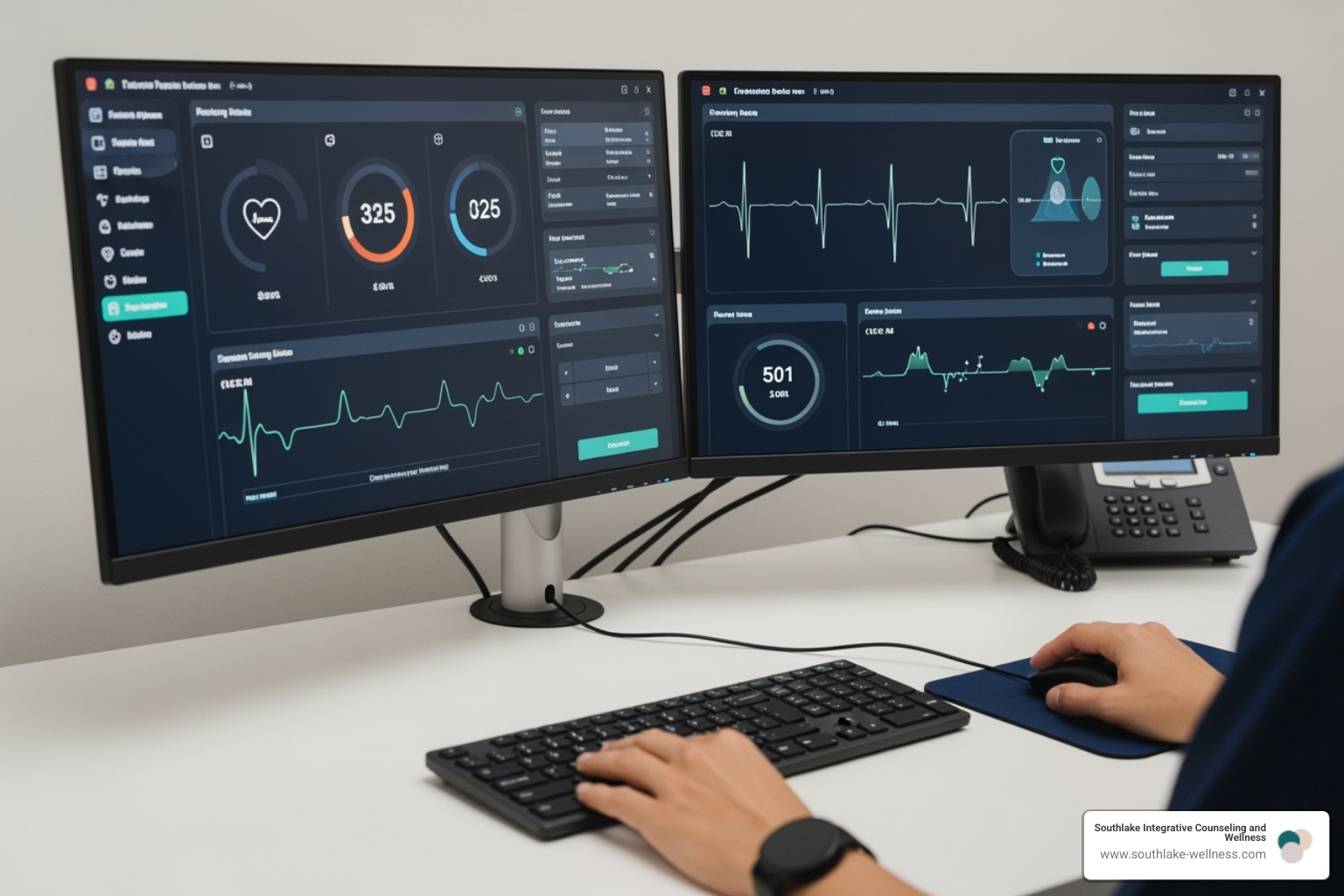
Finding Personalized Mental Health Care
The Limits of Traditional Mental Health Treatment
For a long time, mental health treatment often followed a standardized script. Imagine trying to fit every foot into the same size shoe – it might work for some, but for many, it's uncomfortable, ineffective, and can even cause more pain. This "one-size-fits-all" approach has been a significant limitation of traditional mental health care.
When we rely on broad, common treatments without deeply considering the individual, we often see high non-response rates. Patients can become incredibly frustrated when they try multiple medications or therapies, only to find little or no relief. This trial-and-error approach, while sometimes necessary, can be disheartening and lead to people giving up on treatment altogether. We believe that everyone deserves a more direct path to feeling better.
Why Standard Treatments Fall Short
The challenges with standard mental health treatments often begin with how conditions are diagnosed. Traditional approaches frequently rely on symptom-based diagnoses, often referencing the Diagnostic and Statistical Manual of Mental Disorders (DSM). While the DSM provides valuable frameworks, it can sometimes lead to an oversimplified view of complex human experiences. It tends to focus on symptoms rather than the underlying causes or the unique interplay of factors contributing to an individual's distress.
This emphasis on broad categories overlooks the immense patient heterogeneity. As we know, 1 in 5 U.S. adults deals with a mental health condition, but their experiences are vastly different. What causes depression in one person might be entirely different from what causes it in another. For instance, research shows that depression itself is incredibly heterogeneous. Yet, we often start with the same treatments for everyone, even though about 50% of people don't respond to first-line treatments for depression. Moreover, roughly 30% of those who do seek treatment experience no remission with any of the available options. This highlights a critical gap: if treatments aren't custom, they're less likely to succeed.
For example, a 2023 study found that 27% of people with previously unmedicated depression were identified as having a 'cognitive biotype.' This means their brain's cognitive control circuit showed decreased activity in specific regions, making them less likely to respond to traditional antidepressants. Without a personalized mental health care approach that identifies such biotypes, these individuals might endure a long and frustrating journey of ineffective treatments.
Individual Therapy in Southlake
Receive personalized mental health care tailored to your unique needs. Our licensed therapists provide compassionate guidance. Book your Individual Therapy Session now.
What is Personalized Mental Health Care and How Does It Differ?

Personalized mental health care marks a wonderful shift in how we approach well-being. Think of it not as trying to fit you into a pre-existing mold, but as crafting a mold specifically for you. It’s about creating a treatment plan that is as unique as you are.
At Southlake Integrative Counseling and Wellness, we truly accept this idea. Our approach is rooted in the biopsychosocial model. This means we look at your whole picture: not just your psychological symptoms, but also your biological makeup (like genetics and brain chemistry), your social environment (your relationships, work, and community), and all your unique life experiences. We know that mental health conditions show up differently for everyone, and each person responds uniquely to different supports. This is truly person-centred care, where your individual preferences, values, and goals are at the very heart of every decision we make together.
It's a deeply collaborative approach. We work with you, shoulder-to-shoulder, not just for you. This builds a strong, trusting relationship and opens up honest communication. Unlike a reactive approach that might wait for symptoms to get really tough before stepping in, personalized mental health care is wonderfully proactive. It aims to spot potential challenges early, prevent things from escalating, and build lasting resilience for your long-term wellness.
To make it super clear, here’s a quick look at how personalized mental health care truly stands apart from traditional methods:
FeatureTraditional Mental Health CarePersonalized Mental Health CareAssessmentFocuses on symptom checklists and broad diagnostic categories.Comprehensive, delving into medical history, lifestyle, genetics, personal goals, and social context.TreatmentStandardized protocols (e.g., CBT for depression, SSRIs for anxiety).Custom, combining evidence-based therapies with alternative modalities, medication, and lifestyle changes.Patient RolePassive recipient of treatment, follows expert instructions.Active participant in decision-making, empowered, and engaged in their healing journey.GoalsSymptom reduction and remission.Holistic well-being, long-term resilience, personal growth, and prevention of relapse.
Beyond the Label: A Deeper Approach to Diagnosis
Moving past broad diagnoses means we don't just give you a label and then a standard treatment plan. Instead, we dive deep to understand the intricate mix of your experiences. This involves exploring your personal history, understanding your environment, and seeing how all these factors have shaped your unique mental health journey. We know that two people with the same diagnosis can have vastly different needs and respond best to different kinds of support.
This deeper approach is backed by amazing new scientific findies. For example, scientific research on depression subtypes is showing us that depression isn't just one single illness. It's actually a collection of distinct patterns, or "biotypes." By identifying these specific patterns, like the 'cognitive biotype' we mentioned earlier, we can move towards treatments that are much more precise and effective. This level of detail helps us understand why certain symptoms appear and what might be going on beneath the surface, guiding us toward truly targeted solutions.
Tailoring the Treatment, Not Just the Patient
Once we have this comprehensive understanding, that's when the real magic of tailoring begins. It’s all about matching the therapy to you, rather than trying to squeeze you into a pre-set therapeutic box. This might mean blending different evidence-based therapies, like Cognitive Behavioral Therapy (CBT), with calming mindfulness practices, or exploring other holistic modalities that truly resonate with your values and daily life.
Integrating lifestyle changes is also a super important part of the puzzle. At Southlake Integrative Counseling and Wellness, we look at how nutrition, sleep, physical activity, and stress management can profoundly impact your mental well-being, embracing the mind-body connection. Personalized mental health care isn't a fixed plan; it involves dynamic treatment plans that grow and change right along with your needs. As you make progress, your plan can be adjusted, fine-tuned, or even expanded to include new strategies. Most importantly, your preferences and values are always front and center, ensuring that your path to wellness feels authentic and truly empowering. This collaborative spirit means you're an active partner in your healing journey, not just a passenger.
The Transformative Benefits of a Custom Mental Health Strategy

Imagine a mental health journey where you truly feel seen and understood. That's the power of a custom mental health strategy. When your treatment plan is designed just for you, the changes can be truly amazing. We often see much better results, patients feel more involved, and there can be fewer unwanted side effects. This custom approach often leads to feeling better, faster. And, believe it or not, it can even save money in the long run!
Better Outcomes and Lasting Wellness
One of the most exciting parts of personalized mental health care is how it helps people get well and stay well. When we look at all the unique pieces that make up your mental health, we're building a stronger path to lasting wellness. It’s not just about making symptoms go away for a little while. It’s about giving you the tools to understand yourself, bounce back from challenges, and truly thrive. This approach helps you build resilience and focuses on your whole well-being – mind, body, and spirit.
Here are some of the key benefits we consistently see:
- Increased Efficacy: By understanding your unique biological, psychological, and social factors, we can choose treatments that are much more likely to work for you. This means less wasted time and effort on things that might not help.
- Reduced Trial-and-Error: Remember how about half of people don't respond to their first treatment for depression? Personalized mental health care aims to cut down on that frustrating cycle. For example, some studies show that about 27% of people with depression have a 'cognitive biotype' that makes traditional antidepressants less effective for them. By finding these unique patterns early, we can help you avoid treatments that likely won't work, right from the start.
- Greater Patient Engagement: When you feel heard, understood, and part of the planning, you're naturally more motivated. This team approach builds trust and helps you feel truly in charge of your healing journey.
- Long-Term Savings: While a detailed assessment might seem like a bigger step at first, the benefits often outweigh the initial cost. Getting the right treatment sooner, having fewer relapses, and feeling more productive often leads to big savings in healthcare costs and a much better quality of life over time.
The Economic Case for Personalization
The benefits of personalized mental health care aren't just personal; they make good economic sense too. When people get effective, custom support, it’s a smart investment. For example, one study found that every $1 invested in a specific mental health program led to a $2.39 return, just from lower healthcare costs. A big part of these savings came from helping employees with moderate mental health needs, stopping their conditions from getting worse and becoming more expensive to treat.
This approach isn't just about saving money, though. It’s about building a healthier, more productive community. When mental health support truly works, it means lower overall healthcare costs, fewer days missed from work or school, and people being more productive in their lives. The fact that many people prefer accessible, personalized care shows that this approach benefits everyone – individuals and society as a whole. Investing in personalized mental health care is truly an investment in people and our collective well-being.
How Technology is Supporting Personalized Mental Health Care

We truly live in an exciting time! Technology is rapidly changing how we approach everything, and mental health care is no exception. For personalized mental health care, this means a huge leap forward. It allows us to make decisions based on real data. We now have advanced tools to assess what's truly going on. This isn't just about cool gadgets; it's driving amazing research and innovation in our field. We're getting closer to understanding the human mind with incredible precision.
The Role of Digital Tools and Data
Digital tools are completely changing how we understand, keep track of, and provide personalized mental health care. Think about it: we can now use smart digital assessments to get a much deeper look into your mental state. This includes how you think, your habits, and what makes you, well, you. These tools also let us track your progress all the time. This means we get real-time clues about how you're responding to treatment. We can make timely adjustments, ensuring your plan always fits.
This data is incredibly important. It helps us see specific needs that might not show up in traditional, less frequent therapy sessions. Technology also plays a huge role in matching you with the right support. It helps us connect you with the best therapeutic approaches and even specific providers. This is all based on your unique profile and what you prefer. To dive deeper into how these digital advancements are shaping the field, you can explore scientific research on digital tools in mental health.
Cutting-edge technologies like AI (Artificial Intelligence), genetic testing, and brain imaging are leading this revolution. Imagine AI analyzing huge amounts of information – from how you speak to your social media interactions or even your body's biometric data. This helps detect small changes in your mood or behavior early on. Genetic testing can give us valuable hints about how you might react to certain medications. This can reduce that frustrating "trial-and-error" process so common in traditional mental health care. Brain imaging, like fMRI, helps us map brain activity. It can identify "biotypes" – specific patterns of how your brain works (or doesn't). These patterns often link to different mental health conditions. This guides us toward treatments that are truly on target for you.
Uncovering Clues from Assessment and Monitoring
The secret sauce for truly effective personalized mental health care starts with a thorough initial assessment. But it doesn't stop there! We also continuously track your symptoms. This isn't just a one-time snapshot; it's an ongoing process of observing and fine-tuning. Our initial conversations go deep. We look at your medical history, your lifestyle, what you hope to achieve, and your social world. This paints a full, colorful picture of your unique situation.
Beyond that first assessment, continuous monitoring is key. Often, digital tools and even wearable tech help us do this. This allows for constant, personalized mental health care adjustments. We can see how your symptoms might change, what triggers might be present, and how different treatments are truly impacting your daily life. This dynamic feedback loop means your treatment plan stays relevant and effective, always growing with you.
A recent study on assessment and depression subtypes really shows how important these detailed assessments are. By finding specific depression biotypes through brain imaging, researchers can predict who might not respond to common antidepressants. Instead, these individuals might benefit more from non-medication treatments like transcranial magnetic stimulation (TMS). This kind of precise diagnosis and monitoring means we're moving away from guessing games. We're moving towards treatment strategies that are truly individualized and effective. Knowing this lets us make much smarter clinical decisions.
Finding Your Path: Accessing and Implementing Personalized Treatment
Navigating mental health care can sometimes feel a bit like trying to find your way through a maze. But when it comes to finding personalized mental health care, it's actually becoming much clearer and more accessible. Your journey truly begins with a deep, thorough assessment. This leads to a carefully crafted treatment plan, and then it's about finding the right professional who genuinely believes in care that's made just for you. As you move forward, we keep a close eye on your progress, using continuous monitoring and feedback to make sure your plan is always hitting the mark and changing with your needs.
The Assessment and Planning Process
Your first step, the initial consultation, is all about you. It's your chance to share your story, your worries, and what you hope to achieve. We believe in taking the time to truly listen and understand, because your unique story is the most important piece of the puzzle. After this, we might do some psychological evaluations. These can be simple questionnaires, in-depth conversations, or even advanced tools like genetic testing. Imagine getting a peek into how your body specifically handles certain medications – genetic testing can offer clues about which ones might work best for you and have fewer side effects. It’s like having a personalized roadmap for your body's chemistry!
All this rich information helps us work with you to set goals that truly matter to you. We'll explore what "recovery" and "well-being" look like in your own words. From there, we create your dynamic treatment roadmap. This isn't a rigid, unchangeable plan; think of it as a flexible guide. It can blend different proven therapies like CBT, DBT, or EMDR, help you manage medications, and include lifestyle changes or holistic approaches that feel right for you, like mindfulness, better nutrition, or somatic experiencing. Your plan is designed to grow and change right along with you, with regular check-ins and adjustments to make sure it's always supporting your journey.
How to Find and Access Personalized Mental Health Care Options
Finding personalized mental health care means looking for providers who truly put you at the center of their approach. Here are some simple steps to guide you:
- Talk to your current provider: If you're already receiving mental health support, chat with your therapist or doctor about your interest in a more personalized approach. They might be able to adjust your current plan or point you toward specialists.
- Explore integrative and holistic practices: Places like ours, Southlake Integrative Counseling and Wellness, are set up specifically to offer holistic mental healthcare right here in Southlake, Texas. We blend well-researched therapies with alternative methods to help you find emotional balance and strength. Our special way of working focuses on the connection between your mind and body, creating personalized mental health care plans for individuals, couples, and even groups. We truly believe in treating the whole person, not just the symptoms you're experiencing.
- Ask about their assessment methods: When you're looking into different providers, don't be shy about asking how they assess new clients. Do they go beyond simple checklists? Do they consider your lifestyle, your genetics, and your personal history? These are good signs they offer deeper, more personalized mental health care.
- Look for comprehensive, individualized care: Seek out centers that offer a variety of services and have a team of different specialists. This often means they have the resources to truly tailor your treatment. Keep an eye out for terms like "precision mental health," "individualized care," or "person-centered treatment" in their descriptions.
- Consider initiatives like the U.S. Department of Veterans Affairs: For veterans, the VA has been a leader in using precise, personalized techniques, especially for conditions like depression and PTSD. This shows how important and effective personalized care is becoming.
Finding the right fit is incredibly important. Don't hesitate to ask questions and search for a provider who truly aligns with your values and your desire for a healing journey that is uniquely yours.
Challenges and the Future of Mental Health Treatment
While the promise of personalized mental health care is immense, its widespread adoption and equitable access face several significant challenges. It's like building a wonderful new road – we know where we want to go, but there are still some bumps and turns to smooth out. We're talking about complex issues like making sure it's affordable for everyone (cost and insurance coverage), keeping your personal information safe (data privacy and ethics), and helping mental health professionals learn these new ways of working. Plus, we always need more research to ensure these new approaches truly help.
Overcoming Barriers to Widespread Adoption
Bringing personalized mental health care to everyone who needs it, on a grand scale, means we have some important problems to solve:
First, there's the cost concern. Advanced tools and custom treatments can seem more expensive upfront. Our goal is to find innovative ways to fund these services and improve insurance coverage so that everyone, no matter their background, can access this custom support.
Then, as exciting new technologies like AI, genetic testing, and digital tools become more common, we need to agree on how they should be used. Standardizing new technologies is key to making sure they are safe, secure, and truly effective for everyone.
It's also important to remember that many mental health professionals are used to traditional ways of working. Integrating personalized approaches into clinical workflows means we need to provide easy-to-use tools and ongoing support to help them adapt and accept these innovative methods.
With all this new data being collected, there are important questions about privacy. Ethical guidelines for data use are essential to protect your personal information, ensure your consent, and make sure that technology is used fairly. Building trust is paramount in mental health care.
Finally, we need to focus on educating both clinicians and patients. Professionals need training on new diagnostic tools and ways to deliver therapy. Patients, like you, also benefit from understanding how personalized mental health care works and how they can actively participate in their own healing journey.
The Future of Personalized Mental Health Care
Despite these problems, the future of personalized mental health care is incredibly bright and full of exciting innovations on the horizon. We envision a future where mental health treatment isn't just personalized, but also predictive (foreseeing potential issues) and preventive (stopping problems before they start).
Imagine digital phenotyping, where your mobile devices or smartwatches could subtly pick up on changes in your sleep patterns, activity levels, or even how you communicate. This could signal a potential mental health challenge early on, allowing for proactive support before things get harder. Likewise, wearable technology could go beyond fitness tracking, offering real-time biometric data like heart rate variability, giving professionals a more complete picture of your mental and physical state.
We're also seeing incredible progress in scalable interventions. Telehealth and digital therapies are already making care more accessible. In the future, AI-driven tools could offer immediate support and help guide individuals to the right level of care, making personalized mental health care widely available to many more people.
This all fits into a bigger vision called Predictive, Preventive, and Personalized Medicine (3PM). This holistic model aims to predict your risk for certain conditions based on your unique profile, put preventive strategies in place before symptoms even appear, and then deliver highly personalized treatments exactly when and how you need them.
Looking ahead, we anticipate even more innovations on the horizon. This includes advances like using genetic insights to choose the most effective medications with fewer side effects (pharmacogenomics), new non-invasive brain stimulation techniques, and even the potential for therapies like psychedelic-assisted treatments custom to your unique brain. The ongoing integration of artificial intelligence and machine learning will continue to improve how we analyze data, predict outcomes, and match individuals with the most effective resources and interventions.
The ultimate goal is to significantly reduce the often long and frustrating journey between when symptoms start and when you find relief, making mental health support more efficient, more effective, and truly unique to each and every person.
Conclusion: Embracing a New Era of Individualized Wellness
We're truly standing at a turning point in mental health care. For too long, the idea of a "one-size-fits-all" approach simply hasn't worked for everyone. It's become clear that we need a more thoughtful, kind, and personal way forward. That's where personalized mental health care comes in. It beautifully shifts the focus from just broad labels to you, the unique individual. Because let's be honest, your journey to feeling better is entirely your own.
The wonderful benefits of this approach are truly profound. Imagine getting better results, experiencing far less frustrating trial-and-error, and feeling much more involved in your own healing process. Beyond that, it can even lead to positive impacts on a larger scale. By using smarter assessments, embracing helpful technology, and building a strong, collaborative relationship between you and your provider, we're building a future where mental health support is truly custom-made, proactive, and genuinely effective.
Here at Southlake Integrative Counseling and Wellness, this vision is at the very heart of what we do. We believe in empowering you, not just with treatment, but with understanding. We offer comprehensive, individualized support that truly respects the deep connection between your mind and body. Our holistic approach to mental healthcare blends trusted, evidence-based therapies with other valuable modalities. This helps us nurture emotional balance and build resilience, guiding you along your own unique path to healing and lasting well-being.
The promise of a more effective and compassionate future for mental health isn't just a hopeful dream anymore; it's a vibrant reality we're actively creating, one personalized plan at a time.
For more information about our holistic approach to mental healthcare, please visit our services page: More info about our holistic approach to mental healthcare.
Contact our Southlake team today to schedule a session and prioritize your mental well-being.